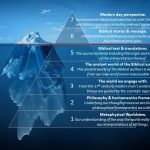Faith
The Call of Truth
Published on October 27, 2020
by Willie Mc Loud
“For this cause I was born, and for this cause I have come into the world, that I should bear witness to the truth. Everyone who is of the truth hears My voice.” (Joh. 18:37)
Throughout the centuries, Christians have asserted that their message is true. They believe their holy scriptures, the Bible, to be the “Word of God”, meaning it is divinely inspired and thus true. But today, more than ever before, there are many dissenting voices. If Christians “believe” that they possess the Truth, then their claim is actually a matter of belief, not of fact. How can truth be equated with things unseen, with things beyond empirical facts, beyond that which can be experienced, observed and verified with our senses or instruments? Is truth not that which can be verified, that which can be shown to be really so? To explore these questions, it is necessary to look into the relation between Faith and Truth in more detail.
When Jesus Christ was brought before Pontius Pilate during his trial before his crucifixion, He gave a concise statement regarding his own ministry, a statement that made a profound claim on truth. He said: “For this cause I was born, and for this cause I have come into the world, that I should bear witness to the truth. Everyone who is of the truth hears My voice.” (Joh. 18:37). Jesus claimed that he came for this very purpose into our material world: To bear testimony to the Truth. Clearly his truth claim goes far beyond what can be empirically known; it is a claim about a greater realty. In fact, elsewhere we read that He claimed: “I am the Truth” (Joh. 14:6). This means that Jesus presented himself as the embodiment of Truth, which Christians understand as the manifestation of God in the flesh.
Truth is No Simple Matter
Although it may seem that the definition of truth is a straightforward matter, namely that truth corresponds with that which is real, with that which really happened, there are instances where it is not that simple. When scientists want to test the truth of a theory, like that of the Big Bang for example, they know that they would never be able to empirically verify that event (see The Scope of Scientific Truth). It is simply impossible and far beyond the possibility of empirical access. What they instead do, is look for indirect evidence to support their thesis. All things that concern the bigger issues of life, those things that go beyond the possibility of direct empirical confirmation, do not have simple and straightforward answers, even though the respective communities (whether the Christian or the scientific community) might “believe” that their views are correct. Incomplete data makes all claims on truth tentative from an empirical point of view. All the big issues of life fall into this category; more than simple and simplistic answers and expectations about “facts” are required in order to make decisions about them (see below).
Many Christians simply believe without questioning. Often they argue that the very fact of incomplete data, together with our restricted human understanding (See Our Restricted Human Understanding), implies that we cannot decide the issue on those terms. For them the testimony of Scripture is enough; they believe that the numerous testimonies of the Biblical authors, people of integrity who lived holy lives, are trustworthy and true, as we read: “[H]oly men of God spoke as they were moved by the Holy Spirit.” (2 Pet. 1:21) They may even refer to Jesus’s words in the story about the Rich Man and Lazarus: “If they do not hear Moses and the prophets, neither will they be persuaded though one rise from the dead.” (Luk. 16:31) Or to put it differently: If someone does not believe the testimony of the Scriptures, s/he will also not believe even when confronted with good evidence.
Incomplete data is, interestingly enough, also the reason why some people are agnostics. They go out from the assumption that there is simply not enough evidence to make an informed decision about matters of faith. What they, however, lose sight of is the fact that this constraint forms an intrinsic part of our human condition! Almost all the decisions we will ever take, and that include the most important ones like who to marry, choosing a life partner, what field of study or occupation to pursue and so forth, are based on incomplete data. Although most people try and do their best to make good and informed decisions in those cases, they are still and nonetheless based on incomplete information. Nobody can be an agnostic of life in the sense of not taking any decisions in the course of their lives. This is why a life well lived is usually one characterized by good decisions made despite all human constraints (and regarded exactly as such as we are all too familiar with and appreciate the challenges of life).
The question sometimes arises as to why God did not reveal Himself more clearly so that we do not have to struggle with these issues. God could surely have made his existence more tangible and obvious, which may have resulted in people believing more easily. Or would they? One of the strange things about Jesus is that He so often spoke in parables. Why did He not present his message in a simple straightforward way so that all could easily be convinced? Once when asked, Jesus replied as follows: “Therefore I speak to them in parables, because seeing they do not see, and hearing they do not hear, nor do they understand.” (Matt. 13:13) He then quotes from the Book of Isaiah, where the prophet says that Israel had closed their eyes to the truth (Is. 6:9-10). Only those who are serious about discovering the truth will find it: “He who seeks finds.” (Matt. 6:8) If one does not have an open heart and mind, nothing will convince them.
A Reasonable Faith
Other Christians assert that they have a “reasonable faith”, that those who are truly willing to explore with an open mind will find enough evidence to believe. In the same way that judges (or juries) who find people guilty are often convinced on reasonable grounds despite incomplete evidence, or scientists who believe in the Big Bang with no more than indirect evidence, Christians assert that there is enough and substantial indirect evidence in support of their faith. They believe that the testimonies of the Biblical authors can be supported by good evidence.
Insofar as historical and archaeological events are concerned, there is indeed a lot of supporting evidence but as is the case with all such evidence, extra-Biblical texts and archaeology can simply not provide evidence for all the things described in the Bible. In the nineteenth century a school existed which argued that nothing which cannot be verified can be believed (positivism). But nowadays all philosophers of science know that archaeologists can never claim or prove to possess a representative sample of historical data; in fact, it is crystal clear that they do not have such data and cannot make truth claims based on a “lack of evidence”. (See article A Critique of Archaeology as a Science and An Archaeological Perspective on the Bible.)
The Christian claim to Truth, however, goes far beyond historical events. This Truth is that God exists and that He has revealed Himself in the person of Jesus Christ. This is a claim about a far greater reality than the material world. This is the claim made by Jesus himself when he says that he bears witness to the Truth, yes, to true reality pertaining to another realm, to another Kingdom, of which He is the King, a Kingdom that is not of this world. But how would one provide evidence for the existence of this other or ultimate reality? A way to do that is to test the pronouncements of prophets who have claimed to have been inspired by God. These are specifically pronouncements about future events that are testable. The main characteristic of a true prophet is that future events prophesied by him indeed come to pass (Deut. 18:22). And certain prophecies can indeed be shown to have been remarkably fulfilled (See A Very Remarkable Prophecy; Can we still believe the Bible, a Prophetic Perspective).
This power of God to know the future and make it known is beautifully described in the Book of Isaiah:
“For I am God, and there is no other;
I am God, and there is none like Me,
Declaring the end from the beginning,
And from ancient times things that are not yet done,
Saying, ‘My counsel shall stand,
And I will do all My pleasure.’” (Is. 45:9-10)
Jesus, the Christ
These two kinds of evidence, namely the truth of the testimonies of the Biblical authors and the fulfillment of Biblical prophecy come together in the person of Jesus Christ. We read, for example, in the Gospel of Luke how the author has done a lot of careful research by gathering eye witness accounts about the life of Jesus (Luk. 1:1-4). As is so often mentioned throughout the Gospels, there were numerous messianic prophecies that had been fulfilled in the ministry and events surrounding the life and death of Jesus.
Even though the skeptical reader may bring forward all kinds of counterarguments, there cannot be any doubt to the honest reader that Jesus’s life did in fact show a striking and detailed correspondence with those prophecies. One of these messianic prophecies that corresponds not only with the events surrounding Jesus’s death but also captures the deep spiritual implications thereof, is the one in Isaiah 53 describing the sacrificial death of Jesus:
“[W]hen we see Him,
There is no beauty that we should desire Him.
He is despised and rejected by men,
A Man of sorrows and acquainted with grief.
And we hid, as it were, our faces from Him;
He was despised, and we did not esteem Him.
Surely He has borne our griefs
And carried our sorrows;
Yet we esteemed Him stricken,
Smitten by God, and afflicted.
But He was wounded for our transgressions,
He was bruised for our iniquities;
The chastisement for our peace was upon Him,
And by His stripes we are healed.” (Is. 53:2-5)
The early church took Jesus’s resurrection as the single most significant confirmation that everything he said was true. St. Paul writes that in accordance with God’s promises, Jesus was born from the “seed of David according to the flesh, and declared to be the Son of God with power according to the Spirit of holiness, by the resurrection from the dead.” (Rom. 1:2-4) In his first Epistle to the Corinthians, written in 53-54 AD, about 20 years after Jesus was crucified, St. Paul quotes an early Creed of the Church emphasizing the bodily resurrection of Jesus:
“For I delivered to you first of all that which I also received: that Christ died for our sins according to the Scriptures, and that He was buried, and that He rose again the third day according to the Scriptures, and that He was seen by Cephas [Peter], then by the twelve. After that He was seen by over five hundred brethren at once, of whom the greater part remain to the present, but some have fallen asleep [died]. After that He was seen by James, then by all the apostles. Then last of all He was seen by me also, as by one born out of due time.” (I Kor. 15:3-8)
The resurrection confirmed that Jesus’s testimony that he came to bear witness to the truth had been true.
The Call of Truth
The Bible does not present God as unreasonable, as One who expects humans not to contemplate and think about their faith, as we read: “’Come now, and let us reason together,’ Says the Lord.” (Is. 1:18) God has provided enough evidence for those who truly seek the Truth in order for them to find it. When Jesus proclaims that He had come into this world to bear witness to the truth, He at the same time announces that “Everyone who is of the truth hears My voice.” (Joh. 18:37) Lovers of truth are the ones who would hear the Call of Truth! In the same way we as humans hear the “Call of the Sea” or the “Call of the Wild”, we have a deep innate desire for the truth, a desire to believe that which is true. We have a deep inner sense which rejects lies and choose truth. This is very similar to our conscience, our deep innate sense of right and wrong. We do not want to be misled; we want to know what is true.
Those who adhere to the call of Jesus, the Call of Truth, will do all in their power to seek and find the Truth. They will not let themselves be fooled by slogans like the one that everyone has their own truth. Obviously, if there is a greater reality than the material world, as Christians believe, and truth is the testimony about what that reality is like, then everyone cannot possess of the truth. Some would rather adhere to a lie, calling it true. But those who love the truth will allow themselves to be convinced about that Truth.
Even though we as humans could never obtain the full picture, only having partial knowledge, as St. Paul says in that beautiful description of divine love (1 Cor. 13:9), and can never get full access to Truth through empirical means due to the very restricted nature of our senses (and thus of our instruments), the serious seeker of the truth will find that the testimonies of the Biblical authors and the prophets are indeed true in every aspect we can realistically expect to verify. Once we understand that we should never require a burden of proof beyond what is reasonably possible and discover that there is nothing contradicting the Biblical truth, we can with great boldness proclaim that what we believe and believe in is in fact true.
In the final instance, we need to accept that we can never prove matters of faith. We might bring good evidence and make strong arguments, but “prove” in the true sense of the word is often not even possible in science. Physicists cannot do that with theories like the Big Bang; Christians cannot do that with God (See Can we still believe the Bible, a Scientific Perspective). But we certainly have good reasons to believe. In fact, if we act on the Call to Truth, and seriously follow this call wherever it leads, we will eventually arrive at that shore where we will be able to say: “I believe”.
And once we experience that divine peace which goes beyond all understanding, the peace that only God can give, we obtain and have the firm hope that the same Jesus who came to present his Call to Truth, will also be true to his word: “I am the resurrection and the life. He who believes in Me, though he may die, he shall live. And whoever lives and believes in Me shall never die.” (Joh. 11:25-26) This is the hope of a life beyond death, a life in a world beyond the material one, a life in the presence of God.
Willie Mc Loud is an independent South African scholar with a wide field of interest spanning ancient Middle Eastern studies, Kantian philosophy and philosophy of science. He has got a PhD in Nuclear Physics (Nuclear Fusion), a MSc in Physics, a MA in Philosophy of Science, an Honours degree in Philosophical Hermeneutics and an MBL.




